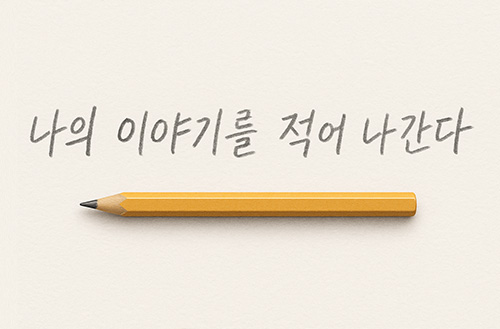
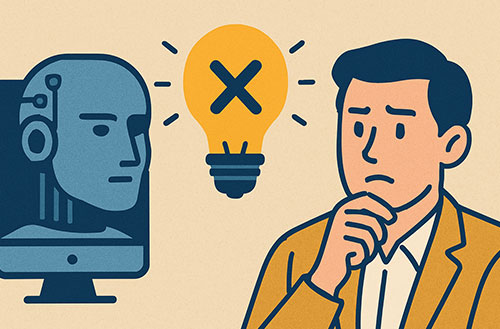
-
-
- 메일 공유
-
https://stories.amorepacific.com/en/amorepacific-how-to-preserve-yourself-in-the-age-of-artificial-intelligence
How to Preserve Yourself in the Age of Artificial Intelligence
On maintaining authentic thoughts and not losing them

Columnist
YONGJOO NA Innovation Management Office

#INTRO
Hello everyone. I’m Yongjoo Na from the R&I Innovation Management Center, joining you as a new columnist. I’ve always written about expanding and organizing my thoughts through personal experiences. Naturally, I’ve spent much time contemplating what makes me “me.” Through this opportunity, I’d like to share conversations with you, readers—sometimes from the perspective of an R&I researcher, other times as an ordinary colleague—going beyond my personal reflections. I hope my writing allows you to reconsider what makes you “you” and how to preserve that.
“Before I called her name / she was nothing / more than a gesture.
When I called her name / she came to me / and became a flower.”
“The Flower” by Chunsoo Kim
Recently, I’ve been using ChatGPT freely in my work. When I wasn’t sure how to use it, artificial intelligence didn’t mean much to me, but once I started using it out of necessity, repeatedly asking questions and receiving answers, I found it more useful than expected! Similar to Chunsoo Kim’s poem “Flower,” generative AI has taken on significant meaning for me through repeated use, unlike before. It provided quite good answers, especially when I needed to generate ideas when I didn’t know where to begin, or when structuring my thoughts while preparing for workshops. To slightly exaggerate, it felt like unblocking stagnant energy.
After a few weeks, one day, when I needed to organize straightforward content, I found myself hesitating for some reason. It was an issue I could have solved with enough personal contemplation, but I craved ChatGPT’s answer. Should I ask? Should I not? I repeated this question to myself. Honestly, I felt somewhat pathetic for even deliberating whether to ask. After much consideration, I didn’t ask because I suddenly realized this wasn’t right. Without knowing it, I had become someone dependent on artificial intelligence.
1 The tendency of knowledge workers to rely more heavily on generative AI
Earlier this year, Carnegie Mellon University and Microsoft published interesting research findings through a joint study. The title is quite long: “The Impact of Generative AI on Critical Thinking: Self-Reported Reductions in Cognitive Effort and Confidence Effects From a Survey of Knowledge Workers.”
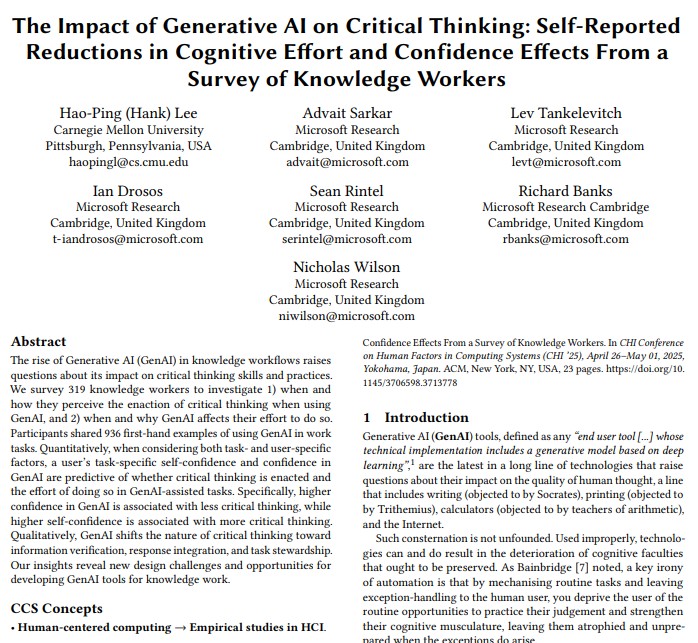
Figure 1. The impact of generative AI on cognitive effort (title and abstract capture
This study surveyed 319 knowledge workers about their experiences using generative AI in the workplace. To summarize, generative AI increases work efficiency for knowledge workers (hope). Unfortunately, it can also negatively affect their thinking abilities (despair). Solving problems naturally requires a process of contemplation and thought. Surprisingly, people who frequently used generative AI showed decreased “cognitive effort” compared to those who used it before.
What is cognitive effort? It encompasses skills familiar to knowledge workers, such as knowledge acquisition, comprehension, analysis, synthesis, application, and evaluation. Simply put, it’s the power of thinking. The research showed that as trust in generative AI increased, critical thinking decreased significantly. I think my earlier experience might be a good (?) example of trying to avoid cognitive effort.
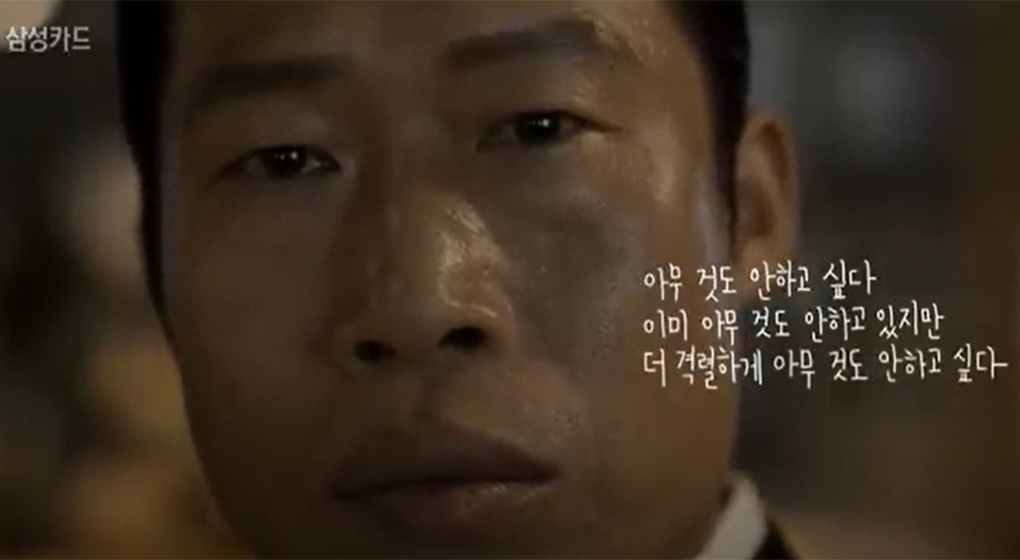
Figure 2. Samsung Card advertisement excerpt - I don’t want to do anything
Looking back, my initial distrust of ChatGPT began when I experienced hallucination (false information). While searching for research paper evidence on a topic, ChatGPT showed me precisely the desired results. However, it had fabricated a non-existent paper to provide an answer. I couldn’t trust something that casually presented false results. But recently, as its performance improved with search functionality, somewhat reliable reference finding, and increased trust through work-related questions and answers, I gradually let go of my suspicion. Alongside this, my work attitude and depth of thinking were changing. I wonder if the allure of swiftly producing plausible answers wasn’t a kind of “spell.”
2 How can we preserve ourselves in the age of generative AI?
We read articles, papers, and books to understand someone’s arguments or stories. Understanding isn’t simply reading through text. While reading, we naturally organize thoughts in our minds, generate questions, and sometimes engage in critical thinking. When we ask generative AI, even for lengthy papers, it shows systematically organized results almost simultaneously with the question. While this provides convenience, isn’t it also stealing our thinking power? Quick and simple summaries are excellent for someone who frequently needs to review papers, but I question whether I’ve been missing opportunities to discover insights beyond what generative AI provides. Results may judge work, but learning lies in the process of achieving those results.
In the paper mentioned earlier, the authors advocate for implementing forced cognitive functions in generative AI tools when providing answers to promote critical thinking. Forced cognitive functions would display indicators (a kind of nudge) warning users “not to accept generative AI results without criticism.” While intentional mechanisms might be necessary, above all, we need to avoid becoming addicted to convenience or overly dependent. Even when busy, I hope we take time to think again rather than accepting generative AI results as they are.
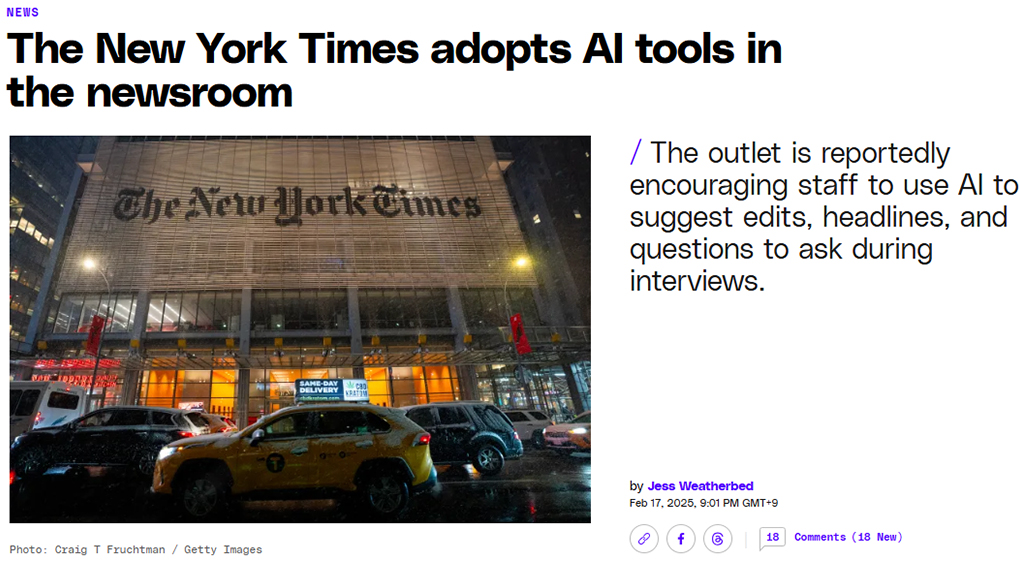
Figure 3. The Verge article (link below) - New York Times allowing AI tools
The New York Times has finally decided to allow editors to use AI tools in their work, dividing what editors should and shouldn’t do. What shouldn’t they use it for? The request not to use it for drafting articles or major revisions makes a lot of sense. Instead, they recommend using it for SEO headlines, summaries, editing suggestions, and idea brainstorming. While the benefits of cutting-edge technology are clear, there are values to be vigilant about and protect, as much as practical applications. Besides company and organizational concerns, to fully protect oneself as a knowledge worker, conscious effort is needed to “prevent generative AI from crossing lines it shouldn’t cross.”
In the Careet interview with author Gilyoung Song, “AI Era, Can I Avoid Being Replaced?”, Song emphasizes “analytical thinking.” Since artificial intelligence isn’t human, you must clearly explain the tasks and goals you want to accomplish. To explain well, the person assigning the task must organize their thoughts coherently. In this interview, he emphasized that the thinking and logical abilities of the person communicating content will become more necessary in the future. Without cognitive and critical thinking, we might risk becoming mere messengers who only relay answers provided by generative AI.
3 An era that requires confidence
Among the participants in the joint research mentioned above, some people didn’t unquestioningly believe generative AI answers. Who were these strange people? I thought they were skeptical individuals, but they turned out to be people with “high confidence in their work abilities.” While entrusting the time and effort of directly examining data to AI for efficiency, they actively verified and judged the accuracy of those answers. The finding that work confidence is needed in this process is quite interesting.
We have lost the ability to see the talent within ourselves,
We have been robbed of the power to adjust environmental conditions to exercise that talent,
We have lost the confidence to overcome external challenges and internal anxieties.
“The Right to Useful Unemployment” by Ivan Illich
Confidence is described as an attitude of believing in one’s abilities in specific situations. Another definition explains it as a concept that includes belief and certainty in one’s abilities. Where does such confidence come from? Confidence is a gift that comes from “successful experiences” after overcoming difficulties. It doesn’t need to be a great success. As people often say, experience small successes multiple times. The meaning of small success may vary according to individual standards, but its effect is tremendous, like a snowball effect where a small snowball grows larger as it rolls. High trust in one’s abilities will reduce mindless dependence on generative AI and promote appropriate use according to the situation.
Let’s come back to where we started. Continuing to use generative AI as a helpful friend for company work is unavoidable. However, don’t casually accept answers using busyness as an excuse; instead, chew on generative AI results thoroughly before deciding whether to swallow or spit them out (critical thinking). Critical thinking is essential to us because when we go through conscious thought processes, we can analyze and evaluate essentials beyond simply accepting information. Although analyzing and evaluating is difficult work, ultimately, we are the ones who make decisions when facing complex problems.
#OUTRO
Now, armed with confidence, let’s do our work (while gently coaxing generative AI). But how can we further develop and strengthen critical thinking apart from confidence? There are traditionally several methods, including reading and discussion. I think “writing” is a good alternative. I’ve found benefits in developing and organizing thoughts while writing. In my next article, I’ll discuss writing as one method for not losing and preserving what makes us “us.”
-
Like
3 -
Recommend
1 -
Thumbs up
0 -
Supporting
0 -
Want follow-up article
0





